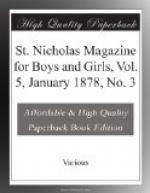R.V.D.
* * * * *
Lancaster, Pa.
DEAR ST. NICHOLAS: Can
you please tell me whether there are
fire-flies in England or not?
We have had several discussions, and I
would like so much to know.—Yours
truly,
AMY.
According to all accounts within our reach there are in England no fire-flies like those of the United States. But there are glow-worms there, and, sometimes, the male glow-worm (which has wings), has been called a “fire-fly.” It belongs to a branch (genus) of the family Lampyridae, which is also the family of its fire-fly cousins, but it is not shaped quite like them, and bears a different scientific name.
* * * * *
Philadelphia, Pa.
DEAR ST. NICHOLAS: I have seen so many little stories written by girls of my age, that I thought I would write also—about iron. It is a very useful metal, without which we would be very much at a loss. Without iron, we could not cook very well; we could not build such houses as we do, because the nails are made of iron, and some of the tools; nor could we have gas, for the gas is conveyed through the different parts of the houses and city by iron pipes. Nor could we have steam-boats, for the machinery which makes them move is made of iron. The buckets which we have to carry water in have iron hoops. The doors have iron locks. The ink with which we write has iron in it. Last, but not least, we have iron in our blood, enough to make a ten-penny nail.
I will tell you of a trip we took to the lead mines. We were spending the summer of 1877 in Wythville, Virginia, and there became acquainted with a family boarding in the same hotel as ourselves. One day they invited us to go with them to see the mines; we had a very long but pleasant ride, and ate our lunch on the grass in the woods, then went on, and at last arrived at the mines. The man who was outside told us that he was “going to harness the ladies’ sleeping car;” the mouth of the cave was so low that a man of ordinary height could hardly stand upright in it: when we started they hitched two carts which were used to carry the ore out of the mine, and put a little donkey to it; the man called the donkey Jenny; we had two or three tallow candles which would not stay lighted; as we advanced further, the water began to leak from the rocks, and the car ran off track; but when we were inside the mine, we were more than rewarded for what we had suffered. The men were working in groups, each group having a lantern, and the lead itself shined; a few men went up a pair of stairs to nearly the top of the mine; but all these beauties could not induce me stay a minute longer than I was obliged, and I can assure you we were all very thankful when we arrived at the hotel, to find a nice supper and warm beds waiting for us.—Your little friend,
JOYCE.




